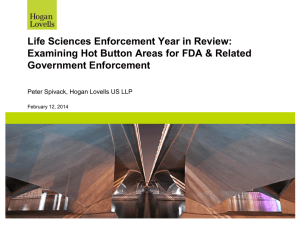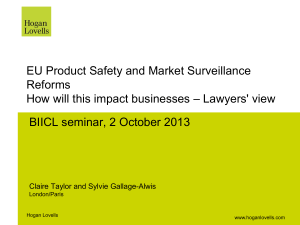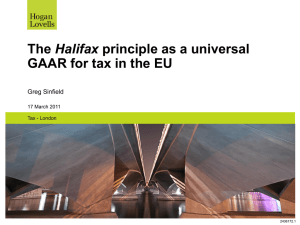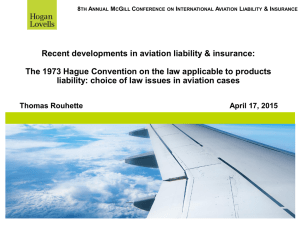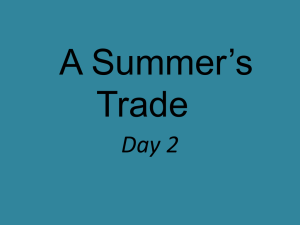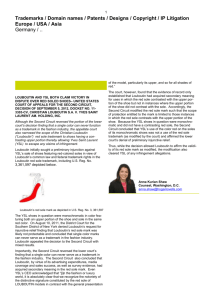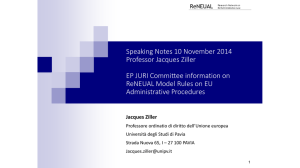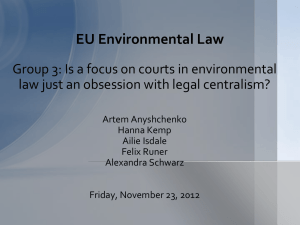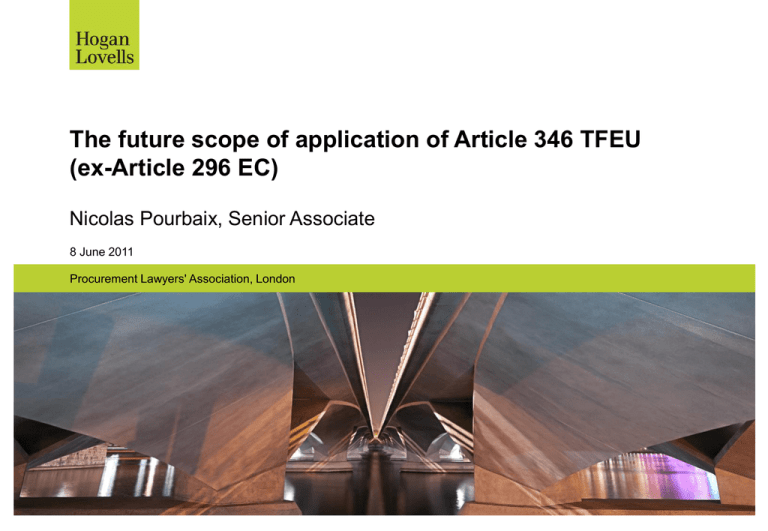
The future scope of application of Article 346 TFEU
(ex-Article 296 EC)
Nicolas Pourbaix, Senior Associate
8 June 2011
Procurement Lawyers' Association, London
Background
•
2 reasons why defence
procurement is not
competitive in the EU:
1. Wide reliance on Article
346 TFEU
2. Existing procurement
Directives not suited to
defence procurement
www.hoganlovells.com
•
New regulatory
environment composed
of 2 elements:
1. Clarification of scope of
Article 346 TFEU
2. New Defence Directive
2
Background
• Article 346 TFEU
1) The provisions of this Treaty shall not preclude the application of the
following rules:
a) no Member State shall be obliged to supply information the disclosure of
which it considers contrary to the essential interests of its security;
b) any Member State may take such measures as it considers necessary for the
protection of the essential interests of its security which are connected with
the production of or trade in arms, munitions and war material; such measures
shall not adversely affect the conditions of competition in the common market
regarding products which are not intended for specifically military purposes.
2) The Council may, acting unanimously on a proposal from the
Commission, make changes to the list, which it drew up on April 1958, of
the products to which the provisions of paragraph 1(b) apply.
www.hoganlovells.com
3
Article 346 TFEU and the Defence Directive
• Scope of Defence Directive
• Article 2
– Subject to Article 346, Directive applies to
•
•
•
supply of military equipment
supply of sensitive equipment
and related works and services
• "military equipment": specifically designed or adapted for military
purposes, intended for use as an arm, munition or war material
www.hoganlovells.com
4
Article 346 TFEU and the Treaty
• Legally and politically serious matter
– excludes application of the Treaty as a whole
• Inherent tension in the article
– protection of Member States' sovereignty
•
•
Member States define their own priorities for security
no place for EU interference with the protection of essential interests of national
defence
– fundamental principles and objectives of the Treaty
•
•
www.hoganlovells.com
primacy of the Treaty and EU law
"effet utile"
5
Protection of Member States' sovereignty
• Case C-252/01 Belgian aerial photography
– low standard of scrutiny over security measures required
– CJEU simply accepted Belgium's argument that contract required special
security measures
• Case T-26/01 Fiocchi Munizioni
– Member States have broad degree of discretion in deciding how to protect
their security interests
– Member States have the choice of measures to protect those interests
www.hoganlovells.com
6
Principles of the Treaty - limiting exempted products
• Case 367/89 Richardt
– derogation must be interpreted strictly
– only the products on the 1958 list can be exempt
• Case 337/05 Agusta Helicopters
– only equipment intended "specifically" for military purposes can be exempt
– dual use equipment: not exempt
– equipment supplied to the military but for civilian use: not exempt
• See also Commission State aid decisions (KSG, Hellenic
Shipyards)
www.hoganlovells.com
7
Principles of the Treaty - limiting automaticity of use
• Case C-273/97 Sirdar
– not an automatic exemption
– exemption applies if and only if conditions of Article 346 TFEU are met
• Case C-414/97 Spanish Weapons
– may only be invoked for security reasons – not economic reasons
– test of necessity: Member State must show that exemption is necessary for
the protection of the essential interests of its security
• See also Own resources cases C-284/05 and others
www.hoganlovells.com
8
Limits to CJEU's scrutiny
• No scrutiny over test of necessity
– CJEU will simply look for security measures invoked by Member State
• No test of proportionality
– CJEU will not assess whether less restrictive measures could achieve the
same result
www.hoganlovells.com
9
Summary of Article 346 TFEU
• Case-by-case assessment – subject to own regime
• 4 key questions:
1.
Are there security interests which the Member State seeks to
protect?
2.
Are these "essential"?
3.
Is there a link between the protection of these security
interests and the procurement?
4.
Is the non-application of the Directive necessary for the
protection of those interests?
www.hoganlovells.com
10
www.hoganlovells.com
Hogan Lovells has offices in:
Abu Dhabi
Alicante
Amsterdam
Baltimore
Beijing
Berlin
Boulder
Brussels
Budapest*
Caracas
Chicago
Colorado Springs
Denver
Dubai
Dusseldorf
Frankfurt
Hamburg
Hanoi
Ho Chi Minh City
Hong Kong
Houston
Jeddah*
London
Los Angeles
Madrid
Miami
Milan
Moscow
Munich
New York
Northern Virginia
Paris
Philadelphia
Prague
Riyadh*
Rome
San Francisco
Shanghai
Silicon Valley
Singapore
Tokyo
Warsaw
Washington DC
Zagreb*
"Hogan Lovells" or the "firm" refers to the international legal practice comprising Hogan Lovells International LLP, Hogan Lovells US LLP, Hogan Lovells Worldwide Group (a Swiss Verein), and their affiliated businesses, each of which is a
separate legal entity. Hogan Lovells International LLP is a limited liability partnership registered in England and Wales wi th registered number OC323639. Registered office and principal place of business: Atlantic House, Holborn Viaduct,
London EC1A 2FG. Hogan Lovells US LLP is a limited liability partnership registered in the District of Columbia.
The word "partner" is used to refer to a member of Hogan Lovells International LLP or a partner of Hogan Lovells US LLP, or an employee or consultant with equivalent standing and qualifications, and to a partner, member, employee or
consultant in any of their affiliated businesses who has equivalent standing. Rankings and quotes from legal directories and other sources may refer to the former firms of Hogan & Hartson LLP and Lovells LLP. Where case studies are
included, results achieved do not guarantee similar outcomes for other clients. New York State Notice: Attorney Advertising.
© Copyright Hogan Lovells 2010. All rights reserved.
* Associated offices

